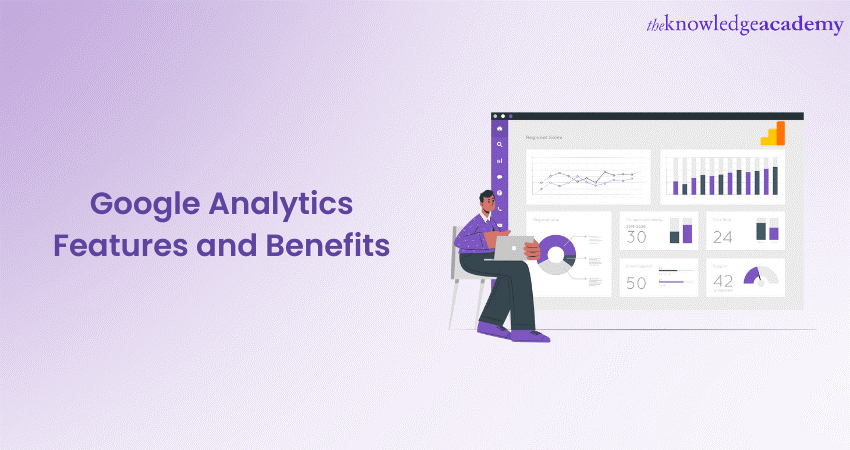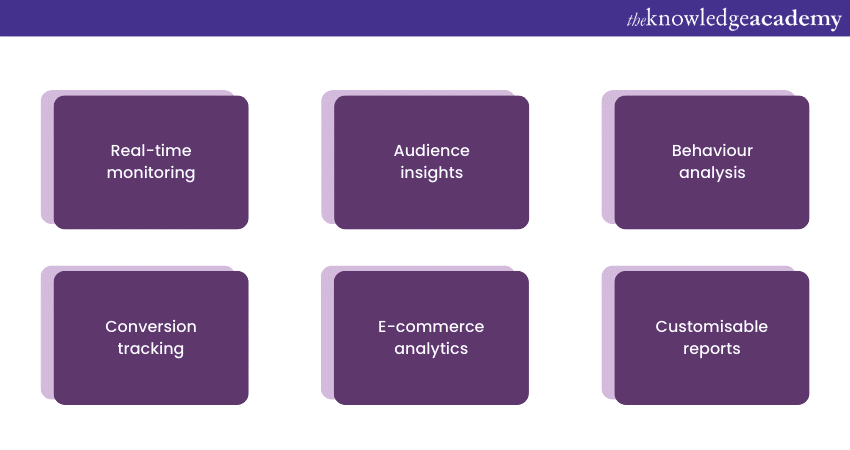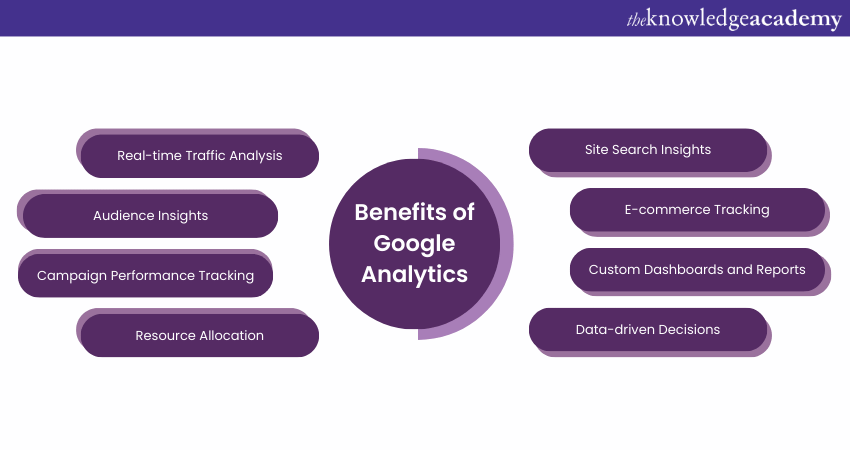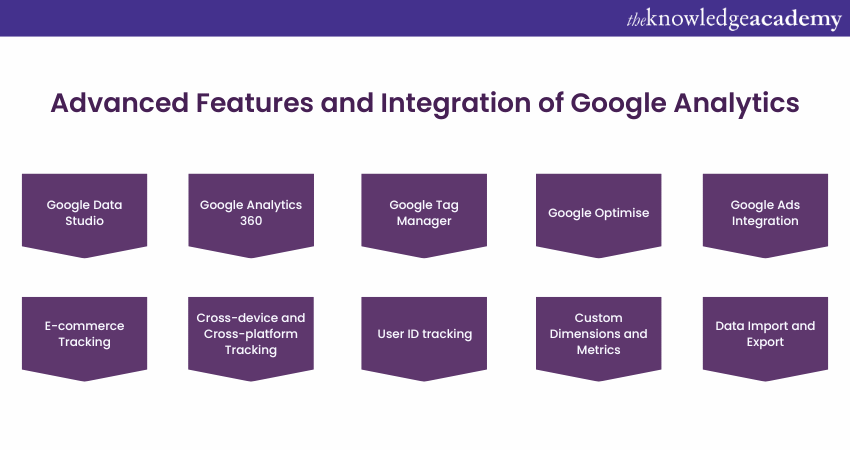We may not have the course you’re looking for. If you enquire or give us a call on + 800 908601 and speak to our training experts, we may still be able to help with your training requirements.
Training Outcomes Within Your Budget!
We ensure quality, budget-alignment, and timely delivery by our expert instructors.

Understanding how your website performs is important for online success, and that's where Google Analytics Features comes in. This tool offers various features designed to help you track, analyse, and optimise every aspect of your website.
According to a Narrative BI report, nearly 9 million websites are using Google Analytics, with the United Kingdom ranking second in usage. As of April 9, 2023, 160,282 UK websites are utilising Google Analytics 4 (GA4). While this is a significant number, it represents only a small percentage compared to the United States, which leads to GA4 adoption.
In this blog, we discuss Google Analytics Features that can give you deep insights into your audience, assess the impact of your marketing campaigns, and improve user experience. Whether you're new to Google Analytics or looking to maximise its potential, this blog helps you harness the power of data to drive your business forward.
Table of Contents
1) What is Google Analytics?
2) Exploring the Key Features of Google Analytics
3) Benefits of Google Analytics
4) How to Utilise Google Analytics for Decision-making?
5) Exploring the Advanced Features and Integration of Google Analytics
6) Conclusion
What is Google Analytics?
Google Analytics is a free web analytics service provided by Google that tracks and reports website traffic. It helps website owners and marketers understand how visitors interact with their sites, providing insights into metrics like the number of visitors, their geographic location, the pages they view, and how long they stay. This data is crucial for optimising website performance, improving user experience, and making decisions.
It also allows users to set up goals, track conversions, and evaluate the effectiveness of their marketing campaigns. Additionally, it provides advanced features like audience segmentation, custom reports, and integration with other Google Tools, making it a powerful tool for decision-making.

Exploring the key features of Google Analytics
Google Analytics offers a plethora of key features that empower website owners and marketers to gain valuable insights into their online presence. Let's explore some of these features in detail:

a) Real-time Monitoring: One of the most captivating features of Google Analytics is real-time monitoring. This feature allows users to observe live data on website activities as they happen. Whether it's tracking the number of visitors on the site, the pages they are currently viewing, or the sources driving traffic, real-time monitoring empowers users to respond promptly to emerging opportunities and changing trends.
b) Audience Insights: Understanding the audience is vital for tailoring content and marketing strategies. Google Analytics provides detailed audience insights, including demographics (age, gender, location) and interests. With this data, users can precisely target their content to resonate with their target audience, enhancing engagement and conversion rates.
c) Behaviour Analysis: Behaviour analysis delves into how users interact with the website. It allows users to track metrics like bounce rates, time spent on pages, and click-through rates. By identifying popular pages and pages where users drop off, website owners can optimise their content and design to keep visitors engaged.
d) Conversion Tracking: Conversion tracking is a game-changer for measuring the success of website goals, such as sign-ups or purchases. With Google Analytics, users can set up and track these conversion goals, gaining insights into the effectiveness of their website in achieving desired outcomes.
e) E-commerce Analytics: For online businesses, E-commerce analytics is a critical feature. Google Analytics enables users to track sales, revenue, and other e-commerce metrics. It also provides data on product performance, helping businesses identify top-performing products and optimise their online stores for better conversions.
f) Customisable Reports: Google Analytics offers a range of customisable reports and dashboards. Users can create reports tailored to their specific needs and objectives. The report feature allows users to focus on the metrics that matter most to their business, facilitating data-driven decision-making.
g) Campaigns: Analyse the performance of your marketing campaigns using UTM parameters. Google Analytics allows you to see how specific campaigns, such as email or social media marketing, contribute to your website traffic and conversions, helping you refine your strategies for better results. This feature helps you allocate resources more effectively by understanding which campaigns drive the engagement.
h) Site Search: Gain insights into what users are searching for on your website using the Site Search feature. This helps you understand user intent, identify gaps in your content, and optimise your website to better meet user needs. By analysing search queries, you can improve the user experience by making high-demand information easier to find.
Benefits of Google Analytics
Here are the Benefits of Google Analytics:

a) Real-time Traffic Analysis: Google Analytics allows you to track and analyse website traffic in real-time. This helps you see how visitors interact with your site instantly, enabling quick adjustments to improve user engagement.
b) Audience Insights: Gain detailed information about your audience, such as demographics, location, and interests. These insights enable you to customise your content and marketing strategies to meet the audience's needs.
c) Campaign Performance Tracking: Evaluate the success of your marketing campaigns by tracking which ones drive the most traffic and conversions. This helps you identify effective strategies and allocate resources.
d) Resource Allocation: Understand which marketing efforts are delivering the best results to optimise your resource allocation. By focusing on high-performing campaigns, you can maximise your return on investment.
e) Site Search Insights: Analyse what users are searching for on your website to understand their intent and needs. This helps you identify content gaps and improve the overall user experience by making high-demand information easier to find.
f) E-commerce Tracking: Monitor sales performance, transaction data, and customer behaviour within your online store. This data allows you to optimise your product offerings and increase revenue.
g) Custom Dashboards and Reports: Create custom dashboards and reports to visualise and analyse the most relevant metrics for your business. This makes it easier to track your key performance indicators.
h) Data-driven Decisions: Google Analytics empowers your business to make informed decisions based on comprehensive data. This leads to improved website performance, ultimately driving growth and success.
Learn how to optimise strategies with our Digital Marketing Tools Training – Join today!
How to utilise Google Analytics for decision-making?
Here are the techniques which users can follow to improve their decision-making using Google Analytics:
a) Traffic Analysis: Understand the sources of website traffic and focus efforts on high-performing channels.
b) Audience Insights: Analyse audience demographics and interests to tailor content and marketing strategies.
c) Behaviour Tracking: Identify popular pages and optimise user experience to reduce bounce rates.
d) Conversion Measurement: Set up goals to track conversions and optimise the sales funnel for better results.
e) E-commerce Analytics: Monitor sales, revenue, and product performance to enhance online stores.
f) Real-time Monitoring: React promptly to emerging trends and capitalise on opportunities.
g) Mobile Performance Analysis: Optimise for mobile users and improve mobile website experience.
h) Custom Reports: Create personalised reports to focus on specific business metrics.
i) Content Performance Evaluation: Identify top-performing content and create engaging material.
j) Data-driven Decision Making: Make informed choices based on concrete data to maximise efficiency.
Exploring the Advanced Features and Integration of Google Analytics
Google Analytics offers users with a host of advanced features and integration functionalities, discussed as follows:

a) Google Data Studio: Create interactive data visualisations and dashboards to analyse website performance.
b) Google Analytics 360: For enterprise-level users, this premium version offers advanced features and increased data processing capabilities.
c) Google Tag Manager: Easily manage and deploy tracking codes and tags without needing to modify website code.
d) Google Optimise: Conduct A/B testing to optimise website elements for better user engagement and conversion rates.
e) Google Ads Integration: Link Google Analytics with Google Ads to track advertising campaign performance and ROI.
f) E-commerce Tracking: Integrate Google Analytics with e-commerce platforms for comprehensive sales and revenue analysis.
g) Cross-device and cross-platform Tracking: Gain insights into user behaviour across different devices and platforms for a holistic view of audience interactions.
h) User ID tracking: Track individual users across sessions and devices for a more personalised analysis.
i) Custom Dimensions and Metrics: Create custom parameters to track specific data unique to your business needs.
j) Data Import and Export: Import external data or export Google Analytics data to other platforms for comprehensive analysis.
Learn how to analyse data with our Google Analytics Certification – Join today!
Conclusion
Google Analytics Features serve as a powerful tool for website owners and marketers, offering a wealth of data-driven insights. With real-time monitoring, audience insights, conversion tracking, and advanced integrations, businesses can make informed decisions to optimise their online presence, enhance user experience, and achieve their goals. Businesses can harness the potential of various features, thereby staying ahead of the competition and driving success in the dynamic digital landscape.
Learn the various modelling techniques with our Data Analytics for Marketing Professional Course – Join today!
Frequently Asked Questions

Yes, Google Analytics can help improve your website's SEO performance by giving insights into which keywords, pages, and traffic sources are driving the visitors. By analysing this data, you can optimise your content and strategies to boost search engine rankings.

Google Analytics helps with customer retention by tracking user behaviour, such as how often visitors return and which pages they frequently visit. This data allows you to identify areas for improvement and tailor your content or offers to keep customers engaged.

The Knowledge Academy takes global learning to new heights, offering over 30,000 online courses across 490+ locations in 220 countries. This expansive reach ensures accessibility and convenience for learners worldwide.
Alongside our diverse Online Course Catalogue, encompassing 19 major categories, we go the extra mile by providing a plethora of free educational Online Resources like News updates, Blogs, videos, webinars, and interview questions. Tailoring learning experiences further, professionals can maximise value with customisable Course Bundles of TKA.

The Knowledge Academy’s Knowledge Pass, a prepaid voucher, adds another layer of flexibility, allowing course bookings over a 12-month period. Join us on a journey where education knows no bounds.

The Knowledge Academy offers various Digital Marketing Courses, including the Digital Marketing Tools Training, Google Analytics Certification, and Data Analytics for Marketing Professional Course. These courses cater to different skill levels, providing comprehensive insights into Email Communication.
Our Digital Marketing Blogs cover a range of topics related to Google Analytics, offering valuable resources, best practices, and industry insights. Whether you are a beginner or looking to advance your Google Analytics skills, The Knowledge Academy's diverse courses and informative blogs have got you covered.
Upcoming Digital Marketing Resources Batches & Dates
Date
 Digital Marketing Course
Digital Marketing Course
Fri 10th Jan 2025
Fri 28th Feb 2025
Fri 4th Apr 2025
Fri 16th May 2025
Fri 11th Jul 2025
Fri 19th Sep 2025
Fri 21st Nov 2025







 Top Rated Course
Top Rated Course


 If you wish to make any changes to your course, please
If you wish to make any changes to your course, please


